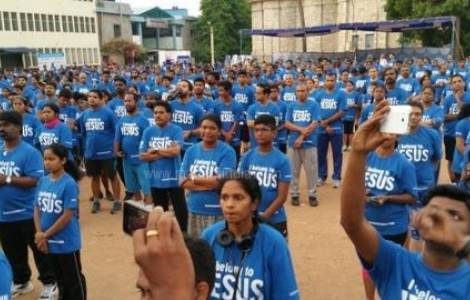Anti-Conversion Laws are a wound to the nation, says Catholic Lay Association
George Kommattam - September 2025

The so-called anti-conversion laws in force in twelve Indian states are “a wound to Indian democracy, national ethics, freedom of belief, conscience, and expression.”
This strong statement came from the All India Catholic Union (AICU), the largest movement of Catholic lay people in India and Asia, during its General Assembly held in Mangalore. The AICU noted that several petitions have already been filed before the Supreme Court, challenging these laws as unconstitutional.
Founded 106 years ago and currently led by Elias Vaz, the AICU said that such laws aim to “reduce freedom, constrain consciences, and make religious beliefs subject to judicial approval.” The Union accused Hindu nationalist groups of using these laws to criminalize non-Hindu communities, especially Christians, Muslims, Dalits, and indigenous peoples.
At the assembly, which brought together about 150 delegates from across India, the AICU condemned hate campaigns and hostility toward religious minorities. It also launched “Bandhutva”, an interfaith dialogue initiative on compassion, inspired by the values of Mother Teresa and Mahatma Gandhi. Another key theme discussed was “crisis management” – how communities should respond to attacks, violence, or controversies.
The AICU recalled that anti-conversion laws are currently in force in: Rajasthan (2025), Karnataka and Haryana (2022), Madhya Pradesh, Uttar Pradesh, and Gujarat (2021), Himachal Pradesh (2019), Uttarakhand (2018), Jharkhand (2017), Chhattisgarh (2006), Arunachal Pradesh (1978), and Odisha (1967).

Journalist and AICU member John Dayal noted that since the Bharatiya Janata Party (BJP) came to power in 2014, many states have passed new anti-conversion laws or made older ones more stringent. He said these laws are based on the false idea that religious minorities threaten the nation’s identity and unity.
Dayal explained that Hindu nationalist groups also link the issue to population growth, spreading fears that non-Hindu communities might replace Hindus as the majority. He pointed out that while conversion laws existed in some states since the 1960s, they have spread rapidly in the last decade, especially in BJP-ruled states like Gujarat, Haryana, Himachal Pradesh, Jharkhand, Karnataka, Madhya Pradesh, Uttar Pradesh, and Uttarakhand.
In Rajasthan, for example, the 2025 law declares conversions “illegal” if they occur through “false representation, force, undue influence, coercion, inducement, fraudulent means, or marriage.” The law’s vague wording, Dayal said, allows almost any conversion to be labeled illegal. The burden of proof is also shifted: the person converting must prove that no fraud or coercion was involved.
Punishments are especially harsh if the convert is a Dalit, Adivasi, woman, or child. These groups, Dayal said, are viewed by Hindu nationalists as “easily influenced” and are therefore targeted to maintain a so-called Hindu majority.
The AICU reaffirmed its mission to defend the rights and freedoms of faith and conscience for all people in India. (Source: Agenzia Fides)
Send your feedback to : onlinekeralacatholic@gmail.com